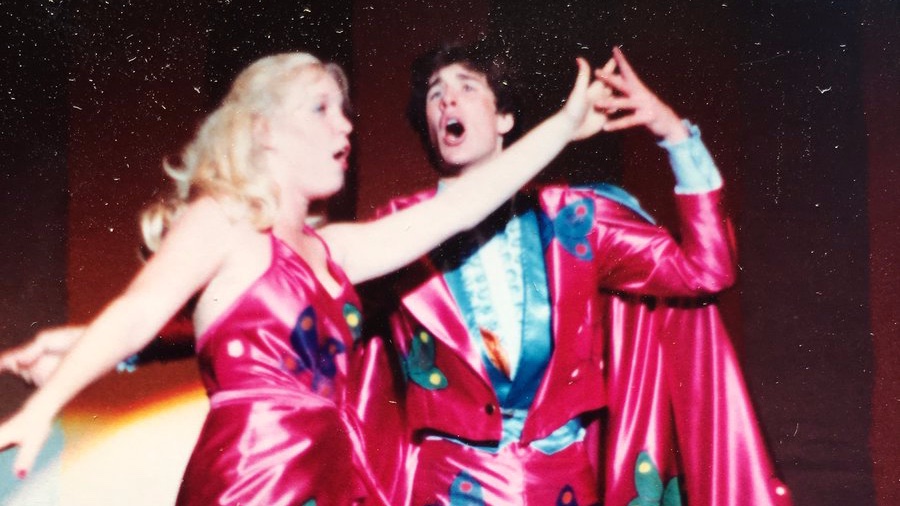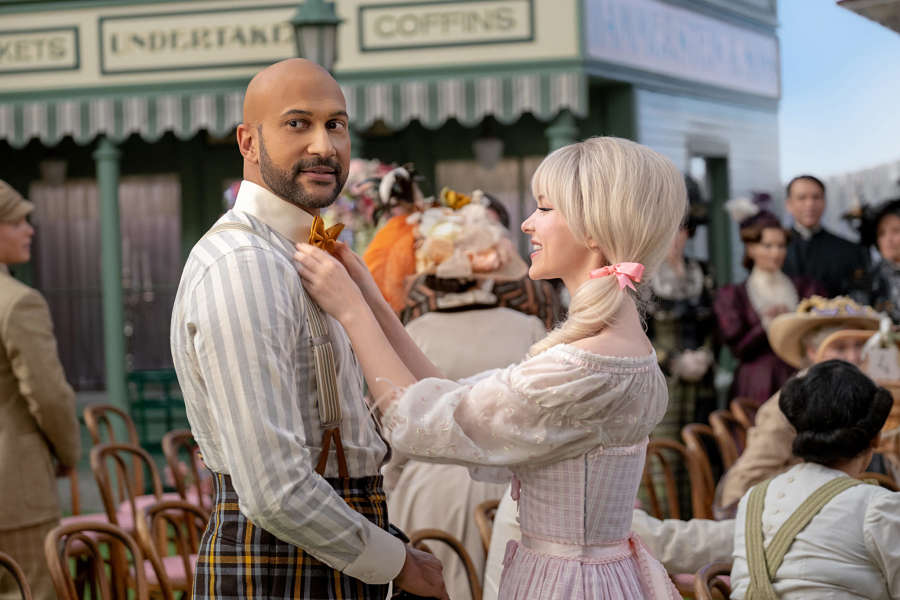Near the beginning of the sparkling new Apple+ series Schmigadoon!, two doctors meet cute at a hospital vending machine, as one laments a suspended Snickers bar and the other suggests a well-placed kick to pry it loose. The result is a waterfall of candy, as the machine empties its wares on the floor and love blooms between Melissa (played by Cecily Strong) and Josh (Keegan-Michael Key).
For musical theatre fans, that’s what the six-episode bounty of Schmigadoon!, which begins streaming on July 16, may feel like: a virtual torrent of sweets, one after another, with both a sugar high and the possibility of lasting love in the offing. The show is a veritable box of chocolate valentines to the mid-20th-century American musical, in which creators Cinco Paul and Ken Daurio incisively but affectionately parody the small-town Americana of The Music Man and Oklahoma!, with trace elements of Carousel, The Sound of Music, Seven Brides for Seven Brothers, Guys and Dolls, Kiss Me, Kate, and, of course, Brigadoon.
How do the doctors at the vending machine end up in a musical? Well, that’s the conceit: Years later, Melissa and Josh are on a mountain retreat to bolster their stagnating relationship when they stumble into the magical town of the title. Looking a bit like River City by way of Oz, it’s a place where the quaint, suspender-and-corset-wearing townsfolk sing and dance their feelings, and where Josh and Melissa will remain stuck until they find—and, of course, sing about—“true love.”
The rough sketch of this idea is one I’ve heard Cinco Paul talk about for decades—we’re childhood friends from Arizona—and it originally started out much closer to Brigadoon, with two city guys stumbling on the magical small town and falling for its old-fangled ways. I even remember Cinco envisioning Jason Alexander and Harry Connick Jr. for the leads (that should tell you how far back this idea goes). Over the years, though, as he and Daurio ascended in their screenwriting careers from Bubble Boy to Horton Hears a Who to Despicable Me, they continued to tinker with the idea and pitch it when they could. Soon the bros-in-a-musical idea morphed into a sort of romantic comedy—though one, as Paul told me in a recent interview, that treated “people who are already in a relationship. I don’t think there are enough of those, about the difficulties of sustaining love and staying together. It’s a little easier to do the ‘they meet for the first time and fall in love’ story.”
There have been songs in a few Daurio-and-Paul joints (Horton and The Lorax among them), and in recent years Paul has been pursuing a side career as a musical theatre composer, adapting the misbegotten film Bubble Boy into a quirky stage tuner and collaborating with Bekah Brunstetter on A.D. 16, a pop musical about Jesus’s teen years (after a few postponements, it’s still slated for a debut at Olney Theatre Center in Maryland). But it wasn’t until their Schmigadoon pitch landed with SNL producer Lorne Michaels that they found a powerful ally who understood their sensibility.
Michaels also backed them on a key selling point. While the show’s conceit has always faintly reminded me of “Once More With Feeling”—the Buffy the Vampire Slayer episode in which Sunnydale is afflicted with a spell that makes everyone sing and dance about everything from their deep desires to their dry cleaning—its realization has another similarity to that precedent: Just as show runner Joss Whedon himself famously did all the songs for “Once More,” the songs of Schmigadoon! were all composed by Paul. That’s a striking rarity; even Rachel Bloom didn’t singlehandedly write all the brilliant songs for Crazy Ex-Girlfriend, this show’s closest antecedent, and Paul told me that there was some talk of bringing in outside composers to contribute songs to Schmigadoon!, a la the Apple+ animated show Central Park.
But writing the songs was a “deal breaker” for Paul, he told me, and that’s where Michaels’ advocacy was crucial. “He stepped up and said, ‘Let Cinco write the songs, because he sees the whole show, it will all be more of a piece,'” Paul told me. He was right to insist. I can hardly be objective about this, of course, but if I had to point to the element that makes the show soar, it’s definitely the songs. While Paul and Daurio put together a killer writers’ room that included Julie Klausner, Bowen Yang, Kate Gersten, and Alison Silverman, and while the show’s script offers artful, capering reframings of romantic comedy and musical theatre tropes, the score, appropriately for a musical, is the pudding where the proof is. (I say that not just because there’s a hilarious, high-stepping hoedown called “Corn Pudding” early in the show.)
It’s also what makes Schmigadoon!, as I wrote to my old friend after previewing the whole thing a few weeks ago, “the most Cinco thing that has ever Cinco’d,” a characterization he called “so accurate it hurts.” He and I met because we had the same piano teacher and later went to the same high school (though not at the same time), and our friendship ever since has been animated by music, film, and theatre, but especially music. He’s the one who turned me onto Elvis Costello and Randy Newman, for instance—two writers he once hoped to emulate as a young pop musician. As he confessed, whenever he would play his piano-based original songs, “People would always say, ‘Oh, that should be in a musical,’ and I was really offended by that. I was trying to be Paul McCartney or Billy Joel or Elvis Costello, and that was the last thing I wanted to hear.”
But musical theatre wouldn’t leave him alone. He’d grown up listening to his mom’s Broadway cast albums, and a later offer to accompany the high school musicals was what Paul called “a turning point in my life.” Though he eventually wangled his way onstage, in a memorable turn as Marco the Magnificent in Carnival, his immersion in the scores of everything from How to Succeed in Business Without Really Trying to Pippin gave him a firsthand look at how music could tell stories.
“Once I’d seen a score, on my Christmas list after that was the Camelot score, the South Pacific score—I got all of them and I played through them. That was a big education. Actually, in preparation for writing the songs on Schmigadoon!, I replayed through all the scores, just to sort of get them in my bones.”
You can hear the fruits of that self-education all over the music for the new series, which includes not only on-the-nose parodies of iconic numbers but a series of honest-to-goodness beauties that could fool the most well-versed show queen.
“Initially my instinct was to be more jokey with the songs,” Paul told me. “I realized that was not the way to go; it was actually hurting the show, so I threw out a lot of early efforts. I wanted these to really exist as if this were an undiscovered Rodgers & Hammerstein or Frank Loesser musical, you know—I didn’t want to put my 21st-century spin on it too much, or make them too jokey. I wanted the joke to be how genuine they were.”
Paul’s love for musicals, like that of many of us, has often been tested and tempered by two common objections, and in many ways these are the twin dramatic engines of Schmigadoon!: that musicals are stupid and corny, which is definitely Josh’s feeling at the start of the series, and that most of the canonical American musicals are hideously retrograde, not least in their heteronormative gender politics. The show’s musical-loving character, Melissa, represents this latter critique, as she alternately embraces and subverts musical tropes with knowing dramaturgical asides and even whole songs (i.e., “Do Re Mi” cheerily refashioned as a sex ed jingle).
Though it wasn’t his first realization of classical musicals’ outdated politics, Paul told me that the sumptuous 2018 Broadway revival of Carousel was another turning point for him.
“It was amazing in so many ways, but I couldn’t get beyond its problems,” he said of the Rodgers & Hammerstein show infamous for valorizing a wife-beating carny. “That stuck with me. And as I would revisit these musicals with new eyes, it’s just everywhere—it permeates all of them, unfortunately. And that’s what happens when you revisit these things from your youth that you so love. It’s like, Why does my favorite thing have this thing in it?”
Ultimately, while Schmigadoon! gives voice to some of these misgivings—at one point, Melissa sums up the premise of a series of canonical musicals as being about “a morally adrift narcissist who needs to change”—its tribute is more loving than excoriating. The answer to the musical’s problems, the show seems to say, is more and better musicals. But can a few tweaks really save this form from obsolescence?
“I mean, that’s a very complicated question,” Paul told me. “In some ways, that’s what our show is trying to do. We’re re-envisioning, deconstructing—all those buzzwords—while also celebrating. It’s saying, ‘But look how wonderful it is.’ Ultimately I think all those musical writers were aspiring to do something great and share messages of love, and that’s still what it’s about when it comes down to it.”
Rob Weinert-Kendt (he/him) is the editor-in-chief of American Theatre. rwkendt@tcg.org





